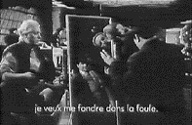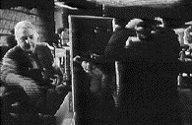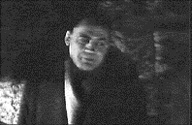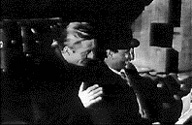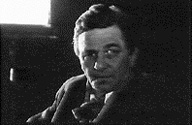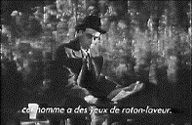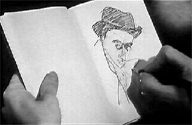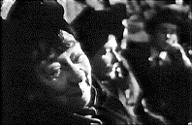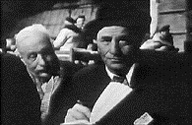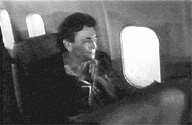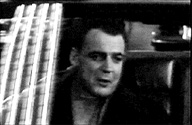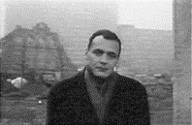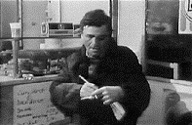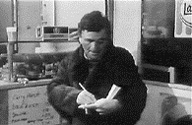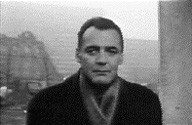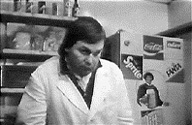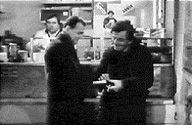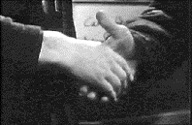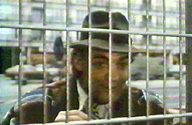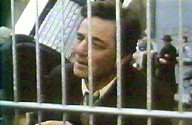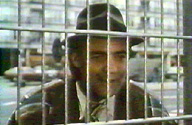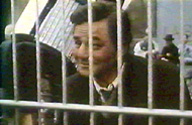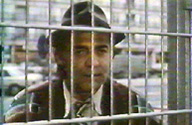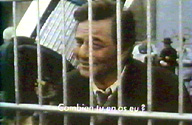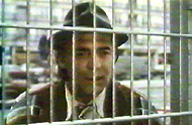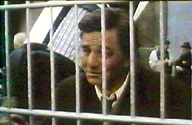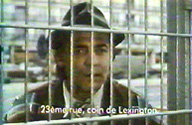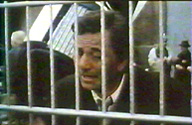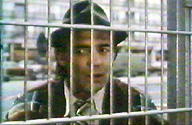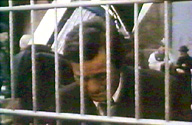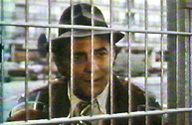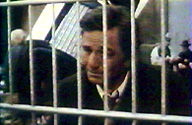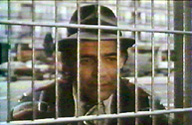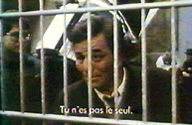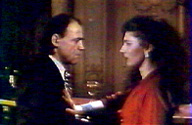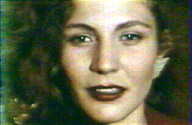|
Peter Falk's 'former angel' role is so central to the story and so essential for the balance of Wings of Desire, that it would be difficult to imagine the film without that part. Yet the role was not even conceived until quite late in the pre-production phase, when Wim Wenders met with Peter Handke at Salzburg in September 1986, only weeks before shooting was to begin. And even at that point, when Wenders knew he needed someone who would be instantly recognized by anyone seeing the picture, the director thought at first that the part might be played by a musician, a painter, a writer, or a politician. He wanted in fact to interest Willy Brandt in playing the role, but gave up on that idea when it proved difficult even to get in touch with the busy statesman. Eventually, Wenders thought of using an actor, who would have to be American to be sufficiently world-famous for the part. He contacted one actor he thought would be right for the role, but who eventually declined because he felt he couldn't do the part, and Wenders was so appreciative of his honesty that he has preferred not to disclose the actor's identity. When shooting began on October 20th, Wenders still had no idea as to who would be cast in the role of former angel. He told me that during those first weeks of shooting, he and his assistant, Claire Denis, returned repeatedly to the same question during their nightly planning sessions: did they or did they not need that character? He said that Claire Denis especially insisted that they needed it, and Wenders agreed but had run out of ideas. Finally, Claire Denis brought up Peter Falk's name one night and Wenders knew immediately that Falk was exactly the actor they needed for the role, since he was not only universally known through his televised Columbo series, but also radiated gentleness and generosity to such a degree that there would be an element of credibility in his playing the part of a former angel. Wenders had admired Peter Falk in Cassavetes' films in the 1970's, and it was probably from Cassavetes that he obtained Falk's telephone number. He phoned one evening, introduced himself, told a little about the film and explained that he needed a former angel, to which Peter Falk replied after a pause: "How did you know?" When Falk asked whether a script could be sent, Wenders said that he had nothing at all in writing about this ex-angel, not even a single page. If anything, that apparently made the part even more interesting to Falk, who answered: "Ah, I've worked like that before with Cassavetes, and honestly I prefer working without a script." Falk arrived in Berlin one Friday in November and he and Wenders spent the week-end together, developing the role on the basis of taped improvisations. All of Falk's scenes were shot the following week, and Falk returned to Los Angeles. Some of the most salient aspects of his part in Wings of Desire stem from events which actually occurred in preparation for or during the shooting. For example, he said that the one problem he had with the film was choosing a hat, and that of course became the basis for the wonderful scene [shots 3030-3039] in which Peter Falk, observed by an amused Cassiel and Damiel in the bunker, tries on a series of hats while exchanging patter with the costume lady until he finds "the hat that fits the face."
Another unexpected addition to the film resulted from Wenders' noticing that Falk frequently made sketches of extras between takes. Wenders asked him if it was all right to use that in the film, to which the actor replied: "Yeah, why not." This is the origin of the scenes in the bunker in which Falk sketches two extras: first the woman wearing a yellow star [shots 3055-3077] and subsequently the man who "has eyes like a raccoon" [shots 4025-4031].
The inner thoughts which we hear going through Peter Falk's mind in these and other scenes, were recorded in a sound studio in Los Angeles, with Wenders directing over a long-distance telephone line, months after those scenes were shot. Wenders had sent Falk some pages to use for these voice-overs, but they just didn't work. Instead of reading the prepared lines, Falk then said, "Let me close my eyes," after which he invented the material that would eventually be used in the sound track of the film. Almost all of his inner monologue was improvised by Peter Falk, including the memorable lines spoken as he sketches the woman with the yellow star:
Not all of Falk's improvisations make complete sense. For example, when we see him for the first time, seated in a plane flying over Berlin, he says in voice-over [shot 1025]: "If Grandma was here, she'd say: "Spazieren... Go spazieren"!
Later in the film, when walking past the ruins of the Anhalter Bahnhof
[shot 5033], he again refers to his grandmother, saying in his inner thoughts
"I wish you were here, Grandma!" As Wenders put it when discussing these
wonderful though not always logical improvisations, "how a former angel can
have a grandmother is a rather doubtful matter."
The main story-line in Wings of Desire concerns Damiel's choice to give up his purely spiritual existence and become a human being. This is the subject of three dialogues he has with Cassiel, the first of which is set in the BMW showroom, in which Damiel first raises the issue by saying [shot 1055]:
Damiel wants to live in time rather than eternity, to have a body, to experience physical pleasure and interact with humans. And of course, once he sees Marion, his quest becomes focused on her, and becoming a man will for him mean becoming her man. How are we to feel about Damiel's desire to exchange his angelic existence for a mortal one? How do we know he isn't making a terrible mistake? After all, we cannot help but like his being an angel, with all the tenderness and generosity he embodies as he eavesdrops on inner thoughts, or places a comforting hand on the stomach of a woman in labor, or smiles at a child looking up at him. Of course, we want Damiel and Marion to be united: this is a desire that is nourished in us from the first time we see Damiel watching Marion on her trapeze, and it is a desire that will be fulfilled for us when they finally meet in the bar at the end of the film. But long before that fulfillment is achieved, we need to know that Damiel is right in wanting to give up his life as an angel to become a man. And even if Cassiel had no reservations about Damiel's plan - which is far from being the case -, that would not be enough to tip the balance in favor of the quest, since Cassiel cannot have in our eyes the status of someone who could know whether or not it is worth sacrificing a purely spiritual existence for the fleeting joys of mortal life. This is where Peter Falk comes in. If there is a single turning point in Wings of Desire, it is the scene at the Imbiss stand, in which - to our amazement - Falk senses Damiel's presence and speaks:
In this scene, Peter Falk is not only the catalyst for Damiel's actually going through with his plan; Falk is also - in our eyes - the guarantor of the rightness of Damiel's plan. And this is what tips the balance for us, in favor of Damiel's becoming a mortal. Falk can do this because he has a special status for us: 1) he enjoys our confidence because we know him as Columbo and as the actor, Peter Falk; and 2) he is the only adult human being in the film who, in this scene at least, can sense the angelic presence we can see. Falk's wishing that Damiel were here becomes our wishing the same for Damiel. For the first time, we can feel, without reserve, that what Damiel is giving up to become a mortal is more than counterbalanced by what he will gain. This scene also serves as the set-up for the film's magnificent pay-off: the scene at the outdoor set in which Damiel - now a man, wearing the sporty outfit he paid for by selling his armor - meets Peter Falk, face to face, and Falk's secret is disclosed for us as it is for Damiel [shots 6020-6034]:
This revelation - which comes progressively as the lines are exchanged, and Damiel's growing perplexity finally gives way to his (and our) catching on - not only explains why Peter Falk could sense Damiel's presence in the earlier Imbiss scene; it also confirms that we and Damiel were right to trust Falk's judgment, and that Damiel will never regret becoming a mortal, since Falk - thirty years after his own transformation - radiates fulfillment and well-being. Furthermore, Falk's "there's lots of us" helps to generalize Damiel's choice to such a degree that the viewer can play at imagining not only that Falk really is a former angel but also that the "us" might include people sitting in the movie theater, even oneself. One of the functions of the former angel role is thus to assure us that in giving up an angelic existence in exchange for mortal life, far more is gained than is lost. In other words, the balance is tipped in favor of mortality. However, Peter Falk's presence also helps to establish another balance - largely verbal in nature - within the film, in the sense that the elevated language written by Peter Handke has as its counterweight the irresistibly down-to-earth and street-wise voice of Peter Falk. Handke's poetry is found, for example, in the childhood poem opening Wings of Desire with the line "Als das Kind Kind war," which will recur as a leitmotif throughout the film. All of the angels' lines were written by Handke, because Wenders wanted Damiel and Cassiel to speak "in a special way, almost old-fashioned language," rather than everyday German. Or as he once put it, with characteristic modesty: the angels "should certainly speak better German than I was able to write." Handke also wrote Homer's inner monologues, the first of which begins [shot 1082]: Tell, Muse, of the story-teller, the childlike ancient one, who ends up at the edge of the world, and let Everyman be recognized in him... And Marion's final monologue spoken to Damiel in the bar [shots 7032-7035], was also written by Handke and ends as follows:
A number of critics have expressed displeasure with this monologue, some finding it pompous and operatic, even "crypto-fascist," and seeing this poetry as a denial of the celebration of the everyday embodied by Peter Falk, as though in ending the film in such a lofty manner, Wenders were in some sense repudiating the everyday he seemed to have affirmed earlier in the film.[2] Another, and in my view, more appropriate way to understand the relationship between the dimensions of the film represented respectively by Peter Falk and Peter Handke, is to see them as balancing and completing one another. In this, as in so many other respects, Wings of Desire is not an either/or film. It does not suggest that a choice must be made between the spiritual and the material, since Damiel's quest is not a denial of the spirit but a wish to live a life in which spirit and body are united. Similarly, no choice is to be made between the lofty and the everyday, the high culture of Homer and the pop culture of Nick Cave, the beauty of childhood and an initiation into adulthood with its risks and its facing up to mortality. These are not presented as mutually exclusive alternatives, but rather as opposites to be embraced within a framework that is open and comprehensive enough to leave room for them all. In this respect, what Peter Falk is doing in Wings of Desire is counterbalancing with the charm of his plain language and manner, the elevated poetry of Peter Handke, just as the simple pleasures Falk represents in the film serve as a counterweight to the complex spirituality embodied by the characters whose lines were written by Handke.
1 An earlier version of this article, containing no illustrations, appeared on pp. 115-120 in Nordisk Film Forskning 1975-1995. En bibliografi & 10 essays in anledning af filmens 100 år, ed. Peder Grøngaard. Aarhus: Nordisk Dokumentationscentral for Massekommunikationsforskning, 1995.
2 See for example David Harvey, The Condition of Postmodernity.
An Enquiry into the Origins of Cultural Change (Oxford: Blackwell, 1989);
esp. pp. 321-323; and Robert Phillip Kolker and Peter Beicken, The Films of
Wim Wenders. Cinema as Vision and Desire (Cambridge: Cambridge University
Press, 1993), esp. pp. 156-159.
| |||||||||||||||||||||||||||||||||||||||||||||
